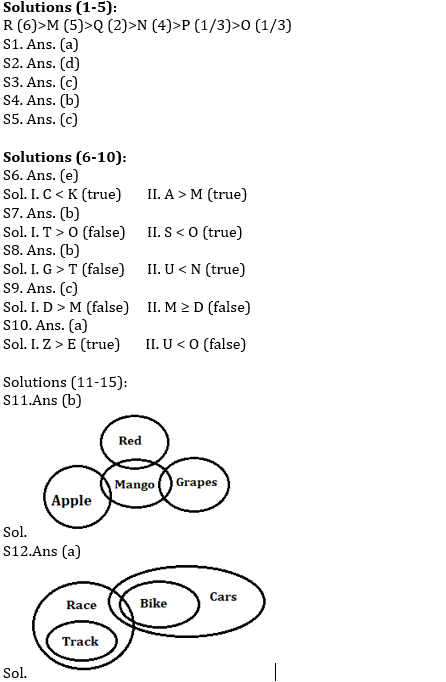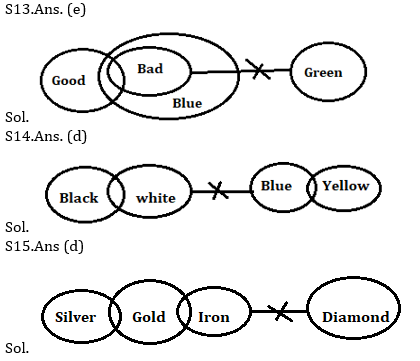Table of Contents
Directions (1-5): Study the following information and answer the given questions.
There are six boxes having different weight. Each box contains different number of candies- 2, 3, 4, 5, 6 and 1 but not necessarily in the same order.
R contains more candies than M and R’s weight more than O, which contains odd number of candies. Box N contains 4 candies. P weighs more than only O. M weighs more than Q and N, but less than R. Box Q contains 2 candies and Q’s weight is more than N. The difference between the number of candies of box M and N is 1 and Box M contains more than 3 candies.
Q1. Which of the following box contains highest number of candies?
(a) R
(b) Q
(c) O
(d) M
(e) None of these
Q2. Which of the following box is third heaviest box?
(a) P
(b) O
(c) R
(d) Q
(e) None of these
Q3. What is the difference between number of candies between box R and Q?
(a) 3
(b) 1
(c) 4
(d) 2
(e) None of these
Q4. Which of the following box is heavier than N but lighter than M?
(a) O
(b) Q
(c) R
(d) P
(e) None of these
Q5. How many boxes are lighter than Q?
(a) One
(b) Two
(c) Three
(d) More than Three
(e) None
Directions (6-10): In these questions, relationship between different elements is shown in the statements. These statements are followed by two conclusions.
Mark answer as
(a) If only conclusion I follows.
(b) If only conclusion II follows.
(c) If either conclusion I or II follows.
(d) If neither conclusion I nor II follows.
(e) If both conclusions I and II follow.
Q6. Statements: A>K>D>L, M≤C≤D, L>Q
Conclusions:
I. C < K
II. A > M
Q7. Statements: T ≥ M ≥ E, E<O, A>E>S
Conclusions:
I. T > O
II. S < O
Q8. Statements: G≥C>U, P=W≥U, W<N<T
Conclusions:
I. G > T
II. U < N
Q9. Statements: R>Q>J>D, M≤C≤J
Conclusions:
I. D > M
II. M ≥ D
Q10. Statements: Z≥V>U, R=E<U, E>M<O
Conclusions:
I. Z > E
II. U < O
Directions (11-15): In each of the questions below are given some statements followed by some Conclusions. You have to take the given statements to be true even, if they seem to be at variance from commonly known facts. Read all the conclusions and then decide which of the given conclusions logically follows from the given statements disregarding commonly known facts.
(a) If only conclusion I follows.
(b) If only conclusion II follows.
(c) If either conclusion I or II follows.
(d) If neither conclusion I nor II follows.
(e) If both conclusions I and II follow.
Q11. Statements:
Only few apple are mango
Some mango are grapes
Only a few mango are Red
Conclusion:
I: Some Red are grapes
II: All grapes can be mango
Q12. Statements:
Only Race are track
Only a few race are bike
All bike are cars
Conclusion:
I: Some cars are race
II: Some track are car is possibility
Q13. Statements:
Some good are bad
All bad are blue
No bad is green
Conclusions:
I. All good can never be green
II. Some blue are not green
Q14. Statements:
Some black are white
No white is blue
Some blue are yellow
Conclusions:
I. Some yellow are white
II. All black can never be yellow
Q15. Statements:
Only a few silver are gold
Some gold are iron
No iron is diamond
Conclusions:
I: All gold can be diamond
II: Some iron are silver
Practice More Questions of Reasoning for Competitive Exams:
Solutions


Practice with Crash Course and Online Test Series for IBPS Clerk Prelims:
- Bank Test Pack Online Test Series (12 Months)
- IBPS PO and Clerk Prime 2020-21 Online Test Series
- SBI PO Prime 2020-21 Online Test Series
Click Here to Register for Bank Exams 2020 Preparation Material




 GA Capsule for SBI Clerk Mains 2025, Dow...
GA Capsule for SBI Clerk Mains 2025, Dow...
 The Hindu Review October 2022: Download ...
The Hindu Review October 2022: Download ...
 IBPS RRB Clerk Cut off 2025, Check Previ...
IBPS RRB Clerk Cut off 2025, Check Previ...





